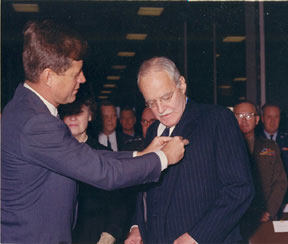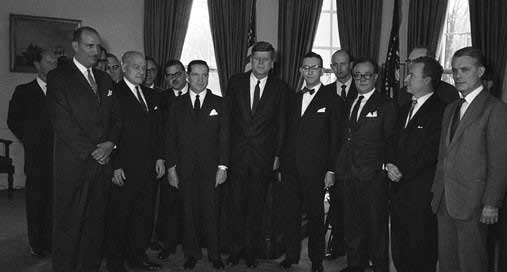Kennedy, who campaigned in the 1960 presidential election as a
committed militarist, entered the White House promising to establish
a new foundation on which to ensure the continuance of American
power in such changing times. His inaugural call that America
was ready to "pay any price, bear any burden" revived a muscular internationalism
that had atrophied. In addition to bringing in Robert
McNamara from the Ford Motor Company to rationalize the Department
of Defense, Kennedy and his civilian advisers looked to
counterinsurgency and covert operations as a way of both breaking
the nuclear deadlock and controlling the rise of third-world nationalism. Kennedy ordered the military to create a branch of the Special Forces that could operate with more flexibility in the third world and
set up a "Special Group" in the White House, headed by General
Maxwell Taylor, to coordinate special-warfare policy at the highest
echelons of government—with the result that superpower conflict
was detoured outside of Europe, particularly into Southeast Asia .
In Latin America, Kennedy's vaulting idealism led to the Alliance
for Progress, an ambitious project that wedded the revolutionary
and counterrevolutionary traditions of American diplomacy—as
did Theodore Roosevelt and other missionary presidents of an earlier
era—this time to especially toxic effect. Announcing the program
to a room full of Latin American ambassadors soon after his
inauguration, Kennedy sought to steal Castro's insurgent thunder,
committing Washington to "completing the revolution of the
Americas." He promised billions of dollars in development aid in exchange
for enacting land, tax, judicial, and electoral reform aimed at
breaking up extreme concentrations of economic and political
power, "to build," as the president put it, "a hemisphere where all
men can hope for a suitable standard of living and all can live out
their lives in dignity and in freedom."
"Let us once again transform
the American Continent into a vast crucible of revolutionary ideas
and efforts," Kennedy roared, "a tribute to the power of the creative
energies of free men and women, an example to all the world
that liberty and progress walk hand in hand. Let us once again
awaken our American revolution until it guides the struggles of people
everywhere—not with an imperialism of force or fear but the
rule of courage and freedom and hope for the future of man."

John F. Kennedy pinning a medal on outgoing CIA Director, Allen Dulles, who advised and orchestrated, among other things, the overthrow of the Arbenz government in Guatemala in 1954, the Bay of Pigs invasion of Cuba, and sat on the board of the United Fruit Company.
But while Kennedy's revolutionary rhetoric encouraged those
who sought change, his actions empowered those who opposed it,
the most illiberal forces in the hemisphere, men who despised
democrats and political liberals as much as they hated card-carrying
Communists. His administration committed the United States
to strengthening the internal security capabilities of Latin American
nations to protect against subversion, turning the region into
a counterinsurgent laboratory. Advisers from the State and Defense
Departments and the CIA worked to reinforce local intelligence
operations, schooling security forces in interrogation and
guerrilla warfare techniques, providing technology and equipment,
and, when necessary, conducting preemptive coups. It was
during this period that national intelligence agencies fortified
and, in some cases, created by the United States—Argentina's Secretaria
de Inteligencia del Estaclo, Chile's Direccion Nacional de
Inteligencia, Brazil's Sistema Nacional de lnformacoes, El Salvador's
Agencia Nacional de Servicios Especiales—began to transform themselves
into the command centers of the region's death-squad
system, which throughout the 1970s and 1980s executed hundreds
of thousands of Latin Americans and tortured tens of thousands
more. Millions were driven into exile. Throughout the worst of the repression,
Washington nominally continued to support Latin America's
"democratic left." But the most passionate defenders of
liberalization and democracy were likely to be found in the ranks of
Washington's opponents—and singled out for execution by Washington's
allies.

President Kennedy with OAS task force in 1961 to discuss Alliance for Progress
Empire's Workshop, Greg Grandin